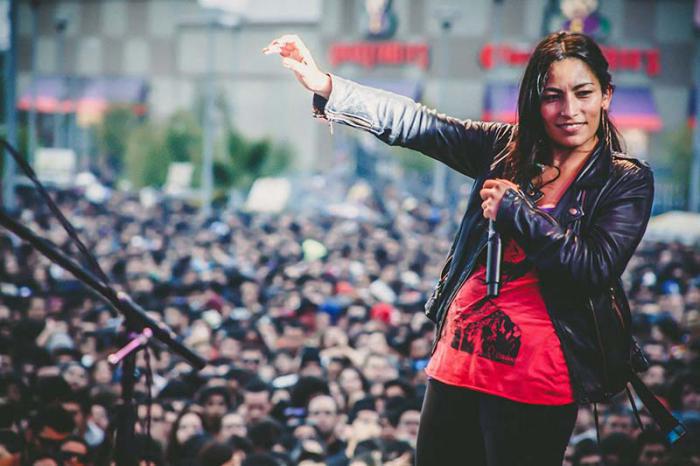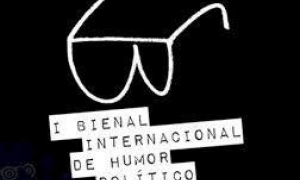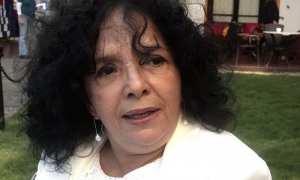
The daughter of members of Chile’s Revolutionary Left Movement (MIR), born in 1977 in exile in France, Anita Tijoux is today a leading figure in Latin America’s hip-hop scene and one of the most important voices of the ever-evolving world of urban music in Chile.
Thirty-eight year old Tijoux returned to her native country in 1993 with her parents after democracy was restored in the South American nation, where she began to perform, first supporting bands such as Los Tetas and Los Gemelos and later as a member of Makiza, one of the most popular groups on the Chilean hip-hop scene, with whom she produced influential albums such as Aerolíneas Makiza.
Anita recorded her first solo album in 2007 called Kaos, which clearly had everything to set her up for mainstream success, something which would occur just two years later when the time bomb that was her fifth studio album 1977, exploded.
The album put Tijoux on the map in Chile in no time, and saw her name spread throughout Latin America’s urban music scene as a one of the most prominent female hip-hop artists together with Mala Rodríguez from Spain. The 14-track album quickly shot to the top of the charts, even attracting the attention of lead singer of Radiohead, Thom Yorke.
However, Anita Tijoux has never fought to establish herself in the hip-hop big leagues or promote herself. Her fight, if ever there were one, is to remain true the principles which brought her to the world of hip-hop. Meanwhile, Anita herself rejects labels which paint her as one of the top MC’s in Latin America.
“The truth is I don’t believe in maximums or minimums, the market repeatedly creates these categories and sub-categories to divide up a culture which needs neither scales of good or bad, that’s why I can’t accept a honor I don’t then share,” she stated speaking to Granma onher upcoming performance at the Patria Grande festival, taking place November 17-26 in Havana and various other provinces across the country.
How has your time living in exile in France with your family after the coup by Pinochet against Salvador Allende influenced your personality?
My parents were members of the Revolutionary Left and the organization founded by Che Guevara in Bolivia in 1967. There was a network in Chile called ELN internationalism, I joined other global struggles and this obviously gave me a certain perspective of the world, a critical vision which I carry with me, in my music and in the way I live and create it.
What is your opinion of rap in Chile and Latin America?
Rap needs to break free from rap and music needs to break itself down in a continual process of questioning. Rapping, making music, songs, creating in all corners and aspects of a country like Chile, where the dictatorship not only left scars of violence on an entire generation, but also installed a cultural dictatorship, is, without a doubt, a tough combat sport. Making art in Chile still isn’t considered a proper job and we live under the stigmatized gaze of those who regard us with suspicion for living off our art. So, I’d say I’m forever riding the wave.
Is it hard being a female rapper?
Being a woman is complicated, although I wouldn’t say particularly in rap. We live in a chauvinistic world, with a modus operandi of violence against the female gender which ranges from words to wages.
What Latin American band or musician are you listening to at the moment?
Lots, we are a continent teeming with new talent and greatly benefited by a wave of musicians from previous generations who have left an indelible historical legacy in every one of us. I like to listen to things that move me. I listen to musicfromChopin to Public Enemy, and more recently I really like Little Dragon, Haitus Kayote.
How do you go about writing songs?
Observation is my tool and thinking out loud, from the behavior of relations sitting around, to a book, or watching a documentary.
What are you currently working on following your most recent album Vengo?
I am giving myself the pleasure of composing just to compose, no pressure, no expectations. When we enter into the machinery of the music industry, we also get caught up in dates and new album deadlines. Personally, I try to write songs at a different pace, a different speed which is really important to maintain and not to loose.
Besides performing at the Patria Grande festival, this year being headlined by female artists, why else did you want to play in Cuba?
Lots of reasons, I fell in love with Cuba in 1998-99’ when I stayed in Alamar. I fell in love with Cuban hip-hop, its process, the conversations and laughs, what was Grupo Uno with Rensoly, and bands like Obsesión, Explosión Suprema, Anónimo Consejo, among so many others. I discovered a fresh kind of hip-hop with a unique identity which made me think a lot about Chile, about the bonds of affection and love. So, I should say that for obvious reasons that I have a love wrapped up here on the island.
I’ve been told that you’d like to put on a concert in a Havana neighborhood. Do you know about the “tour of the neighborhoods,” that Silvio Rodríguez has been doing since 2010?
Yeah, in fact I was in Cuba a few days ago and I saw thatSilvio was playing in a traditional fishing neighborhood. We love music and continue with the deep conviction that all stages are important and vital for us to communicate and develop.






